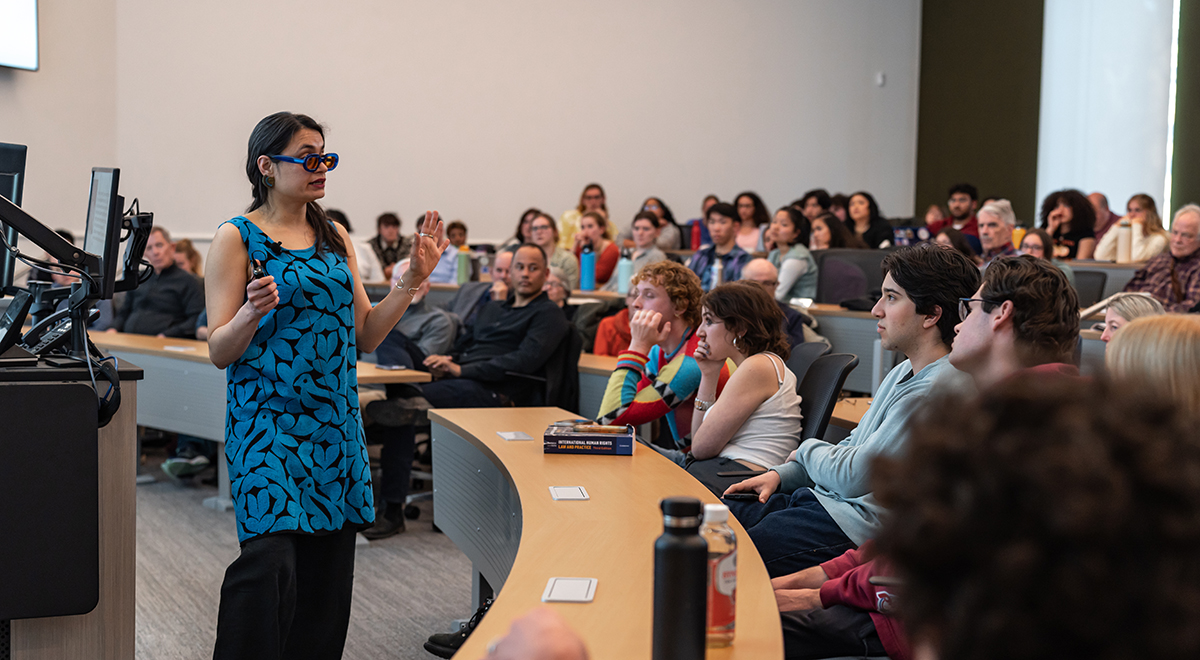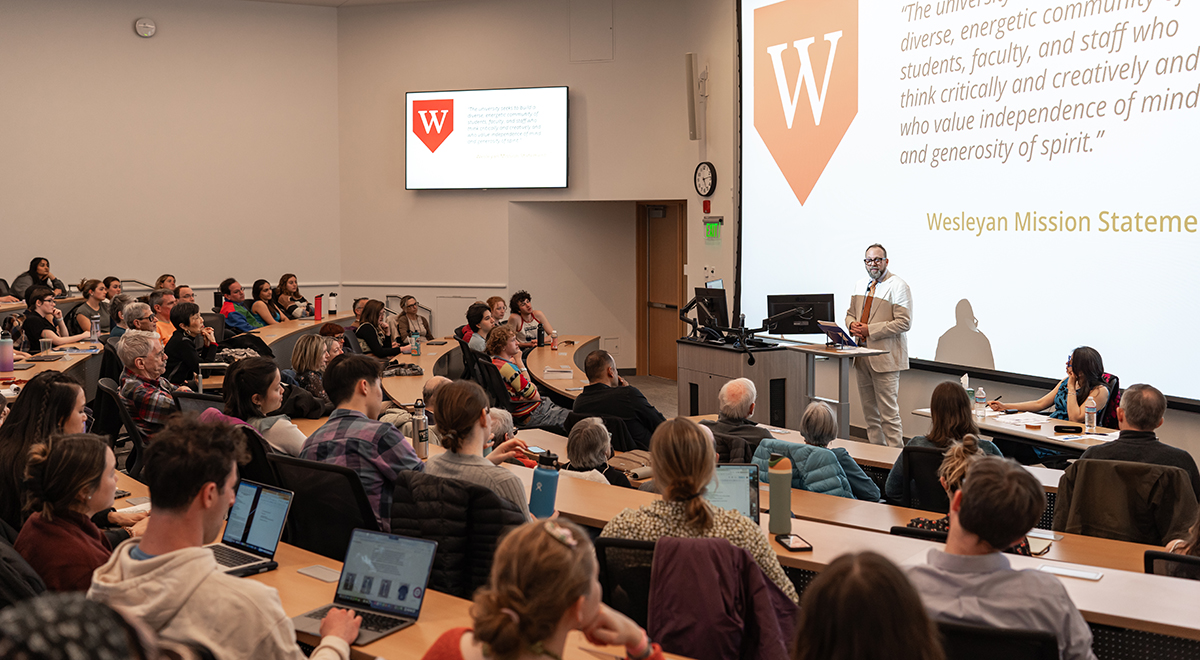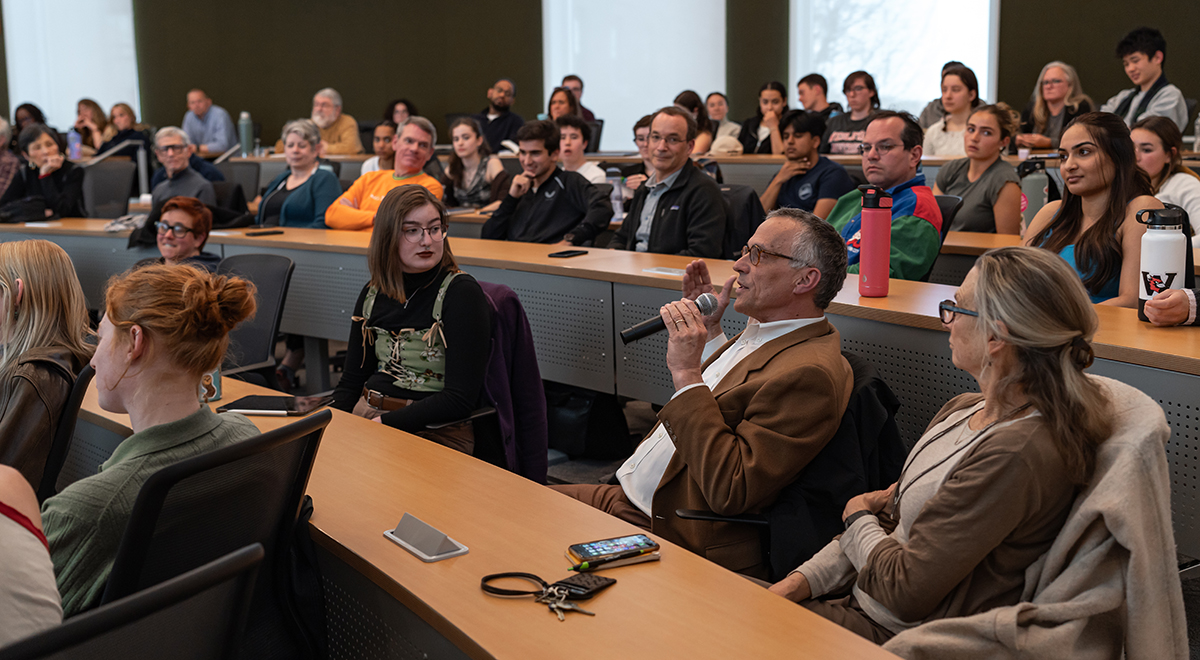Hugo Black Lecturers Establish What’s at Stake When Free Expression on Campus is Imperiled

From book bans to restrictions on teaching, in recent years, there have been clear infringements on First Amendment rights in the U.S. and the problem may be more widespread than people realize.
There was, for example, a 33 percent increase in book bans in the 2022-23 school year from the 2021-22 school year, largely targeting books about race, racism, and gender issues or featuring on LGBTQ+ characters and characters of color. Meanwhile, more than 300 gag order bills have been introduced across 46 state legislatures restricting the discussion of gender and racial identities, censorship of teaching materials, and, in some cases, the promotion of civic engagement since January of 2021, according to PEN America, an advocacy organization that defends creative expression and the rights of writers, artists, and journalists.
Amna Khalid, associate professor of history at Carleton College, and Jeff Snyder, associate professor of educational studies also at Carleton spoke about recent assaults on free speech and academic freedom as they delivered the annual Hugo Black lecture at Wesleyan on March 25 in the Frank Center for Public Affairs. The duo gave an overview of how threats to free expression and academic freedom, regardless of which side of the political spectrum they come from, will make it impossible for higher ed institutions to stay true to their dual mission of training independent thinkers and engaged citizens.
Legislation like the Stop WOKE Act in Florida imposes limits on what and how professors can teach. “It’s fundamentally detrimental to the students learning experience and the tragedy is, at the end of the day, it’s not just the professors who are losing out, it’s really the students who are losing,” Khalid said in an interview before the talk. “What is at stake is the training of our next generation as independent thinkers.”
The lecture — endowed by Leonard S. Halpert ’44 and named for the late U.S. Supreme Court Justice Hugo L. Black — brings crucial First Amendment scholarship to campus each year. Mary-Jane Rubenstein, dean of the social sciences, introduced this year’s lecture, which was presented by the Albritton Center for the Study of Public Life.
Throughout 2024, Wesleyan will gather thought leaders, provide engagement opportunities, encourage discussion in and out of classrooms, and provide information across its many networks to galvanize learning through political participation. Learn about Wesleyan’s Democracy 2024 initiative.

Impact on the Classroom
Restrictions on the freedom to teach and the freedom to learn will not only limit the kinds of information students are exposed to, it will also dampen their ability to innovate, Snyder argued. Education without academic freedom would not be education at all, he said. Without academic freedom, there is no exchange of ideas. There would be no ability of researchers to share findings that challenge the status quo, or even have their findings peer reviewed, he said.
Snyder also stressed the importance of free expression on campus. “Without free expression on campus,” he said “you no longer have an educational institution. You have an industrial institution or a factory, which would just reproduce the state of existing knowledge. It would be a form of indoctrination, not a form of education or liberation.”
Laws like the Stop WOKE Act not only limit the type of information that professors and teachers can present to students, but also the materials they use to teach. This kind of law would make it impossible to assign and engage with important historical documents because they might cause some students “psychological distress.” Khalid, who teaches modern South Asian history, also made the point that such laws make the teaching of U.S. history as well as histories of other parts of the world very challenging. She said she would be “fundamentally unable” to teach most of her courses if a similar law were to be passed in her state.
“[The law] bans any course content advancing the idea that “an individual…bears personal responsibility for and must feel guilt, anguish, or other forms of psychological distress because of actions…committed in the past by other members of the same race.” Khalid said. “That would make it very difficult for me to teach about the rise of fundamentalism in South Asia, for instance.”
What to Do to Promote Democracy
In the face of challenges to free speech and academic freedom, there is work to be done. Snyder argued that maintaining these rights takes day-to-day effort and advocacy. These are rights that need to be cultivated. It takes someone sticking up for another’s right to voice their opinion, even if that opinion disagrees with their own, he said. It takes accepting that there’s always more to learn to have informed positions.
“When you’re confronted with a different viewpoint on campus, you have to learn to live with differences well,” Khalid said. “I think our students are ill-equipped to do that. You have to learn that some degree of friction is actually essential and good for a pluralistic society.”
It also takes voting. In the upcoming, Nov. 5 election, voters will determine who wins thousands of local offices, 468 seats in the United States Congress, and the presidency. Ensuring the nation’s bedrock principles of democracy and free speech is also something citizens will decide at the ballot box.


